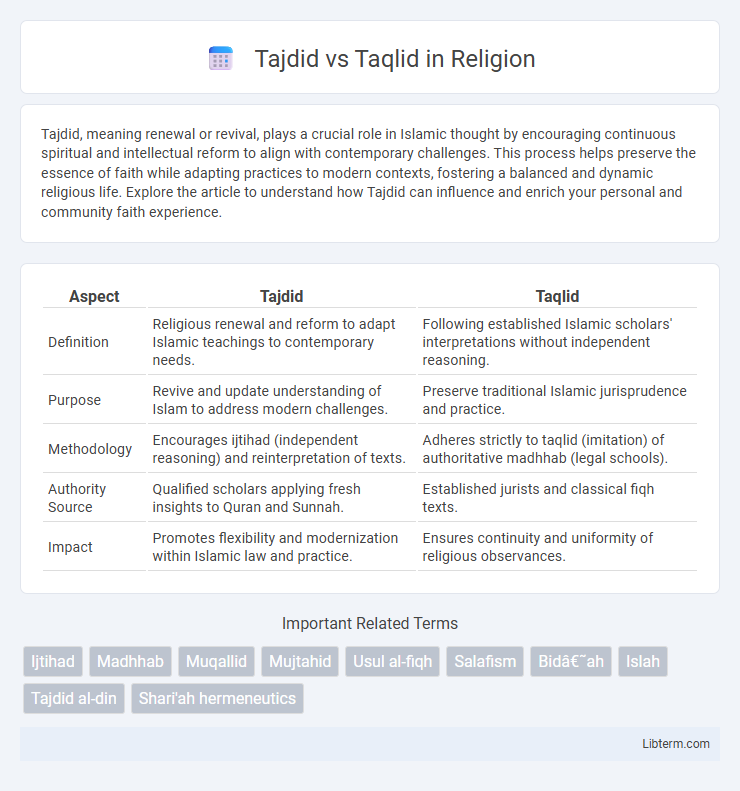Tajdid, meaning renewal or revival, plays a crucial role in Islamic thought by encouraging continuous spiritual and intellectual reform to align with contemporary challenges. This process helps preserve the essence of faith while adapting practices to modern contexts, fostering a balanced and dynamic religious life. Explore the article to understand how Tajdid can influence and enrich your personal and community faith experience.
Table of Comparison
| Aspect | Tajdid | Taqlid |
|---|---|---|
| Definition | Religious renewal and reform to adapt Islamic teachings to contemporary needs. | Following established Islamic scholars' interpretations without independent reasoning. |
| Purpose | Revive and update understanding of Islam to address modern challenges. | Preserve traditional Islamic jurisprudence and practice. |
| Methodology | Encourages ijtihad (independent reasoning) and reinterpretation of texts. | Adheres strictly to taqlid (imitation) of authoritative madhhab (legal schools). |
| Authority Source | Qualified scholars applying fresh insights to Quran and Sunnah. | Established jurists and classical fiqh texts. |
| Impact | Promotes flexibility and modernization within Islamic law and practice. | Ensures continuity and uniformity of religious observances. |
Understanding Tajdid: Definition and Origins
Tajdid, originating from the Arabic word meaning "renewal," refers to the process of revitalizing Islamic thought and practice in response to contemporary challenges while adhering to core principles. Rooted in historical efforts by reformers such as Al-Ghazali and Ibn Taymiyyah, Tajdid emphasizes returning to the Quran and Sunnah with fresh interpretations to address evolving social and moral issues. This concept contrasts with Taqlid, which involves blind imitation of established religious rulings without critical engagement or contextual adaptation.
The Concept of Taqlid in Islamic Tradition
Taqlid in Islamic tradition refers to the practice of adhering to established interpretations and rulings of Islamic law without critical examination or independent reasoning (ijtihad). This concept is central to maintaining consistency in religious practice by following qualified scholars' opinions, primarily within the Sunni and Shia jurisprudential frameworks. The emphasis on taqlid underscores the importance of scholarly authority and transmitted knowledge in preserving doctrinal integrity across generations.
Historical Development of Tajdid and Taqlid
Tajdid, referring to Islamic renewal, emerged prominently during the 18th and 19th centuries as scholars sought to reinterpret foundational texts to address changing social and political contexts, exemplified by figures like Jamal al-Din al-Afghani and Muhammad Abduh advocating reform. Taqlid, the practice of adhering to established legal precedent within the four Sunni madhabs, historically maintained religious stability during the classical period by preserving jurisprudential continuity and consensus. The tension between Tajdid and Taqlid reflects evolving dynamics in Islamic thought, where reformist calls challenged rigid conformity to adapt Sharia to modern realities, influencing subsequent theological and legal debates.
Key Differences Between Tajdid and Taqlid
Tajdid refers to the process of renewal and reform in Islamic thought, emphasizing fresh interpretations and adapting religious practices to contemporary contexts. Taqlid involves strict adherence to established religious rulings and traditions without questioning or reinterpretation, primarily following the authority of past scholars. The key differences lie in Tajdid's encouragement of ijtihad (independent reasoning) versus Taqlid's reliance on conformity to established jurisprudence, impacting the evolution and dynamic understanding of Islamic law and practice.
The Role of Tajdid in Islamic Reform Movements
Tajdid plays a crucial role in Islamic reform movements by emphasizing the renewal and reinterpretation of Islamic teachings to address contemporary challenges while maintaining core principles. It promotes critical engagement with religious texts, encouraging adaptation to social, political, and technological changes without blindly following traditional interpretations known as Taqlid. This dynamic process fosters intellectual revival and progressive thought within Muslim communities, driving meaningful reform and modernization.
Implications of Taqlid for Islamic Jurisprudence
Taqlid, the practice of adhering to established Islamic legal rulings without questioning, solidifies continuity and uniformity in Islamic jurisprudence, preserving traditional interpretations across generations. This reliance on precedent can limit the dynamism of fiqh, potentially hindering adaptation to contemporary contexts and novel issues. The implications of Taqlid underscore a tension between maintaining doctrinal consistency and addressing evolving societal needs within Sharia law.
Prominent Scholars of Tajdid and Taqlid
Prominent scholars of Tajdid, such as Imam Al-Ghazali and Shah Waliullah, emphasized reforming Islamic thought by returning to original sources and contextual reinterpretation, promoting dynamic jurisprudence. In contrast, Taqlid was upheld by scholars like Imam Abu Hanifa and Imam Malik, advocating strict adherence to established madhhab rulings to preserve legal and theological consistency. The debate between Tajdid and Taqlid highlights divergent approaches within Islamic scholarship seeking either innovation in understanding or steadfast maintenance of tradition.
Contemporary Debates: Tajdid vs Taqlid
Contemporary debates on Tajdid versus Taqlid center on the dynamic tension between religious renewal and traditional adherence within Islamic thought. Advocates of Tajdid emphasize the need for reinterpretation of scriptures to address modern challenges, promoting intellectual revival and contextual adaptation. In contrast, proponents of Taqlid argue for strict adherence to established jurisprudence and classical interpretations, ensuring continuity and preserving doctrinal purity.
Impact of Tajdid and Taqlid on Muslim Communities
Tajdid, or renewal, fosters critical thinking and adaptation within Muslim communities, promoting contemporary interpretations of Islamic teachings that address modern challenges. In contrast, Taqlid emphasizes strict adherence to established jurisprudential schools, preserving traditional practices and providing religious stability. The dynamic between Tajdid and Taqlid significantly shapes community responses to social change, educational reforms, and legal interpretations in Muslim societies.
Striking a Balance: Harmonizing Tajdid and Taqlid
Striking a balance between Tajdid (renewal) and Taqlid (imitation) is essential for preserving Islamic principles while encouraging intellectual growth and adaptability. Tajdid invites critical engagement with religious texts to address contemporary issues, whereas Taqlid ensures continuity by upholding established interpretations and practices. Harmonizing these approaches fosters a dynamic tradition that respects heritage while remaining relevant in modern contexts.
Tajdid Infographic

 libterm.com
libterm.com